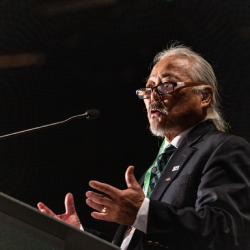A Letter from President Dennis Ojima

Dear ESA Members,
As we summarize the activities of 2022 in this report, we should acknowledge the success of our first in-person Annual Meeting in three years in Montreal. It was a wonderful venue to meet and renew connections with fellow ecologists and with ESA staff. I was especially meaningful to see and to meet so many early career ecologists and students. The meeting also included many additional events to further our efforts to develop services and meeting places for many of our non-academic professional ecologists, an effort we hope to build on further in the 2023 Annual Meeting in Portland.
The Annual Meeting also served to highlight contributions from our ecologists of color and Indigenous community. The workshops and sessions sponsored by these groups were engaging and further enhanced their importance to the development of ESA.
The Annual Meeting was also the initiation of the ESA Future Visioning Project, and in the months that followed we were able to gather further perspectives on how ESA can better serve you and society. This effort will help shape how we move forward to meet your needs while continuing to provide top-notch ecological science publishing services, convening platforms where ecological knowledge can be shared and created, and other services that enhance our members’ engagement with each other and other scientific organizations and communities of practice.
During 2022, ESA also engaged with U.S. federal agencies to advance activities associated with the Biden-Harris executive order calling for the National Nature Assessment, natural capital accounting and nature-based solutions. Thank you to those who provided comments that were included in the ESA response to the government request for information on the design of the first National Nature Assessment. We continue to work with relevant agencies to move these initiatives forward.
As we look back on 2022, we see that there are still many challenges that remain and uncertainties that hamper immediate resolution to many of them. These include the uncertainty around the future publishing ecosystem, responding to the still unresolved DEIJ challenges of engagement and recruitment, and meeting the needs and expectations of non-academic ecology professionals that represent a vast number of trained ecologists. In the coming years as we attempt to implement actions to meet the needs identified in the Visioning Project and navigate the uncertainties facing us, ESA will continue to rely on the insights and voices of its membership to maintain and enhance its abilities to serve the ecological community and society at large. Your continued engagement with ESA and our community is vital to our Society’s success.